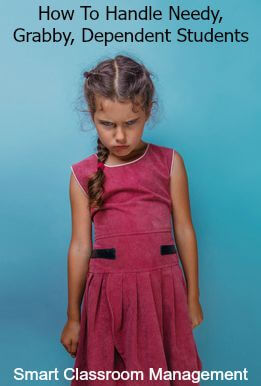 They materialize in front of you, demanding your attention.
They materialize in front of you, demanding your attention.
They pull on your sleeve and tap on your arm.
They barge into your personal space, interrupt you where you stand, and begin talking before you even have a chance to acknowledge them.
They tattle. They complain. They dramatize. They need you to fix their problem right now.
Needy students can be a major source of stress, without a doubt, but here’s the thing.
They aren’t difficult to handle.
In fact, with the right approach, you can not only discourage such behavior, but eliminate it from your classroom altogether.
Here’s how:
Don’t lean down.
When you lean down toward needy students, you encourage their behavior. You encourage more drama and more interruptions in the future.
Simply by staying upright, you’re communicating your boundaries. You’re gently reminding them that you teach an entire class, not just one student.
Now, if there is truly an emergency, your teacherly powers will surely let you know. In which case, leaning down to get more information is appropriate.
Don’t respond.
In the immediate moments following their interruption, it’s important that you don’t respond. It’s okay to look in their direction to let them know you hear them, but refrain from opening your mouth.
Give them a chance to catch themselves, to rethink their behavior, to consider a more mature and polite way of speaking to you.
If a class rule was broken, after pausing, enforce a consequence. “You have a warning because you left your seat without permission.”
Don’t show concern.
Needy, dependent students tend to overreact. They tend to make mountains out of molehills. They tend to rely heavily on the adults in their life rather than themselves.
This tendency will only worsen if you validate their behavior. It will only worsen if you stop what you’re doing, allow them to interrupt you, and show concern.
While this is a natural reaction from a caring teacher, it’s detrimental to their social and emotional development—not to mention your peace.
An Easy Fix
The level of dependency in your classroom is directly related to how you respond to it.
This is a key issue, because if left unchecked, a culture of neediness will infiltrate everything you do. It will affect every lesson, every activity, and every routine.
It will make your life infinitely more difficult and stressful and cause you to be a less effective teacher.
The good news is that it’s an easy fix.
Combined with a reluctance to coddle, over-help, and reteach individual students again and again, the guidelines above will have a remarkable effect on your classroom.
They will turn your students into doers and problem-solvers, independent learners and lean-in listeners. They will build confidence and competence and even strengthen character.
But you have to stop doing what comes naturally.
And instead, do what works.
If you haven’t done so already, please join us. It’s free! Click here and begin receiving classroom management articles like this one in your email box every week.

I have definitely found this to be helpful for me, especially in the lower grades. Often times, the students in grades K-2 are just learning independence and this is an excellent way to try and ensure that they move towards being independent learners and thinkers within the classroom.
It takes a lot of thought and mindfulness from the teacher, but it is so worth it every time to see students grow and mature for it.
~Melissa
Well said, Melissa!
Michael
Does this even work when it is the whiny “he hit me” or “she pushed me”? Will not responding to these ones cause more misbehavior or will it cause them to solve the problem on their own? These are the ones that I have a hard time. Do I need to respond by punishing the other child involved? My gut instinct says no, but then again, I feel like the other student earned a consequence for not following it.
I tend to have more PARENTS who fall in this category!
I do too Leslie. Michael, I would love to get your feedback regarding needy parents. I have parents who don’t know how to separate from their children when dropping them off to the classroom and parents who think arrival time is an appropriate time for me to have a conversation with them. Do you have any suggestions?
Hi Carlie,
It’s a good topic for a future article. I’ll be sure and put it on the list.
Michael
I have students who are independent when it comes to working. They really don’t tattle very often. Your strategies have really worked to create students who believe in themselves.
One of my classes is needy in a different way. If I walk by many of my students, their hands will immediately shoot up into the air to either share a random connection, ask an off-topic question, ask me to read/ check what they’ve done so far, etc… When I indulge them, several hands around will suddenly pop up wanting me to do the same for them. If I don’t, then I feel bad like I’m squelching the enthusiasm for learning. Any ideas?
Thanks!
Hi Melinda,
I’ll be sure to cover this topic in a future article. My new book, due out May 3rd, will also provide the antidote to this common problem.
Michael
Excellent advice. I’m excited to try a new approach and see better results. Thank you!
I love your article! It surely helps my skills as a science facilitator. Thank you.